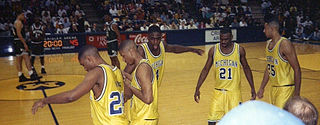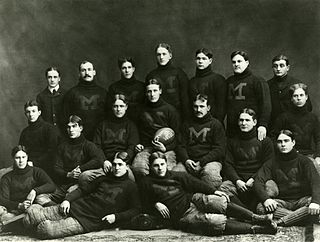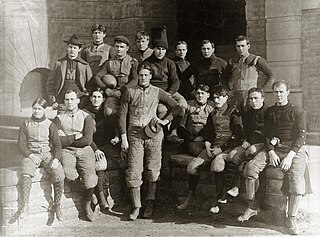
The University of Michigan, often simply referred to as Michigan, is a public research university in Ann Arbor, Michigan. The university is Michigan's oldest; it was founded in 1817 in Detroit, as the Catholepistemiad, or University of Michigania, 20 years before the territory became a state. The school was moved to Ann Arbor in 1837 onto 40 acres (16 ha) of what is now known as Central Campus. Since its establishment in Ann Arbor, the university campus has expanded to include more than 584 major buildings with a combined area of more than 34 million gross square feet spread out over a Central Campus and North Campus, two regional campuses in Flint and Dearborn, and a Center in Detroit. The university is a founding member of the Association of American Universities.

James Anthony Abbott is a former Major League Baseball (MLB) pitcher who played despite having been born without a right hand. He played ten seasons in MLB for the California Angels, New York Yankees, Chicago White Sox, and Milwaukee Brewers, from 1989 to 1999.

Jeffrey Warren Daniels is an American actor, musician, and playwright whose career includes roles in films, stage productions, and on television, for which he has won two Emmy Awards and received Golden Globe, Screen Actors Guild and Tony Award nominations.

The Michigan–Minnesota football rivalry is the first and oldest trophy collegiate game in college football rivalry between the Michigan Wolverines football team of the University of Michigan and Minnesota Golden Gophers football team of the University of Minnesota. The Little Brown Jug is an earthenware jug that serves as a trophy awarded to the winner of the game. It is one of the oldest and most played rivalries in American college football, dating to 1892. The Little Brown Jug is the most regularly exchanged rivalry trophy in college football, the oldest trophy game in FBS college football, and the second oldest rivalry trophy overall, next to the 1899 Territorial Cup, contested between Arizona and Arizona State.

The Michigan–Michigan State football rivalry is an American college football rivalry between the University of Michigan Wolverines and Michigan State University Spartans. Since 1953, the winner of each year's game has received the Paul Bunyan Trophy. The teams first played in 1898 and have met almost every year since 1910. 44 of the first 50 games were played in Ann Arbor, but since then, U of M and MSU have played 30 home games against each other. The competition became a conference rivalry with Michigan State's entrance into the Big Ten Conference in 1950.

Thomas Dudley Harmon, sometimes known by the nickname "Old 98", was an American football player, military pilot, actor, and sports broadcaster.

Tom Izzo ; born January 30, 1955), is an American college basketball coach who has directed the program at Michigan State University since 1995. On April 4, 2016, Izzo was elected to the Naismith Basketball Hall of Fame.

"The Victors" is the fight song of the University of Michigan (UM) written and composed by UM student Louis Elbel in 1898. The song was first played publicly by John Philip Sousa and his band.

The Michigan–Ohio State football rivalry, referred to as The Game by some followers, is an American college football rivalry game played annually between the University of Michigan Wolverines and The Ohio State University Buckeyes. It gathered particular national interest as most of the games from the 1970s through the mid-2000s determined the Big Ten Conference title and the resulting Rose Bowl Game match ups, and many influenced the outcome of the national college football championship. The game was ranked by ESPN in 2000 as the greatest North American sports rivalry.
"Victory for MSU", formerly "MSU Fight Song", is the official fight song of Michigan State University, US. MSU's fight song was created in early 1915, when MSU was known as Michigan Agricultural College (M.A.C.). An MSU cheerleader, Francis Irving Lankey, along with lyricist Arthur Sayles, created the song. With several changes noted below, the school has used the same song ever since. The MSU Fight Song is played at all university sporting events and is frequently sung by students and alumni.
The 1992 NCAA Division I Men's Basketball Tournament involved 64 schools playing in single-elimination play to determine the national champion of men's NCAA Division I college basketball. It began on March 19, 1992, and ended with the championship game on April 6 in Minneapolis, Minnesota. A total of 63 games were played.

The 2000 NCAA Division I Men's Basketball Tournament involved 64 schools playing in single-elimination play to determine the national champion of men's NCAA Division I college basketball. It began on March 16, 2000, and ended with the championship game on April 3 in Indianapolis, Indiana at the RCA Dome. A total of 63 games were played.

The Michigan State Spartans football program represents Michigan State University in college football at the NCAA Division I Football Bowl Subdivision level. The Spartans are members of the Big Ten Conference. Michigan State claims a total of six national championships ; the AP Poll voted Michigan State as national champion one time (1952). They have been named national champions twice in the Coaches Poll. The Spartans have also won two Michigan Intercollegiate Athletic Association championships and nine Big Ten championships.

The 2001 Michigan vs. Michigan State football game, sometimes called The Clock incident was played on November 3, 2001 at Spartan Stadium.

The 1997 Michigan Wolverines football team represented the University of Michigan in the 1997 Big Ten Conference football season. In its third year under head coach Lloyd Carr, Michigan compiled a perfect 12–0 record, won the Big Ten Conference championship, defeated Washington State in the 1998 Rose Bowl, and was declared the national champion by the Associated Press and numerous other polls.

The Michigan State Spartans men's basketball team represents Michigan State University (MSU) and compete in the Big Ten Conference of NCAA Division I College basketball. Their home games are played at the Breslin Student Events Center. Tom Izzo has been the head coach since 1995. The Spartans have won two NCAA championships and 15 Big Ten Conference Championships. Their two National Championships came in the 1979 NCAA Tournament and the 2000 NCAA Tournament. The 1979 National Championship Game was the most watched college basketball game in history, with 35.11 million television viewers. The 1979 National Championship team was coached by Jud Heathcote and included tournament MVP Magic Johnson, Greg Kelser and Jay Vincent. The Spartans defeated the previously unbeaten Indiana State Sycamores, led by future Hall of Famer Larry Bird. The 2000 National Championship team defeated the Florida Gators men's basketball team in the final. The team was coached by Tom Izzo and led by players Morris Peterson, Charlie Bell, Jason Richardson and tournament MVP Mateen Cleaves.

The 1902 Michigan Wolverines football team represented the University of Michigan in the 1902 Western Conference football season. In their second year under head coach Fielding H. Yost, Michigan finished the season undefeated with an 11–0 record, outscored their opponents by a combined score of 644 to 12, and became known as the second of Yost's famed "Point-a-Minute" teams. With a conference record of 5–0, Michigan won the Big Nine Conference championship. The 1902 Michigan Wolverines have also been recognized as the national champions by the Billingsley Report, Helms Athletic Foundation, Houlgate System, and National Championship Foundation, and as co-national champions by Parke H. Davis.

The Fab Five were the 1991 University of Michigan men's basketball team recruiting class that is considered by many to be "One of the greatest recruiting classes of all time." The class consisted of Detroit natives Chris Webber (#1) and Jalen Rose (#5), Chicago native Juwan Howard (#3), and two recruits from Texas: Plano's Jimmy King (#9) and Austin's Ray Jackson (#84). Four of the five were participants in the 1991 McDonald's All-American Game. At first, only three of the freshmen started for the 1991–92 Michigan Wolverines men's basketball team. Although they all played when the season opened on December 2, 1991 against the University of Detroit, they did not all play at the same time until December 7 against Eastern Michigan and did not start regularly until February 9, 1992. In that first game starting together as a regular unit, the five freshmen scored all the team's points against Notre Dame. They started as a unit in all but one of the remaining games for the season. They reached the 1992 and 1993 NCAA Men's Division I Basketball Championship games as both freshmen and sophomores. However, most of their wins and both of their Final Four appearances were vacated due to Webber accepting money from Ed Martin, compromising their amateur status.

The 1898 Michigan Wolverines football team represented the University of Michigan in the 1898 Western Conference football season. With Gustave Ferbert in his second year as head coach, the team compiled an undefeated 10–0 record, outscored its opponents 205–26, and won the Western Conference championship for the first time in the school's history.

The 1896 Michigan Wolverines football team was an American football team that represented the University of Michigan in the 1896 Western Conference football season. In its first and only season under head coach William Ward, the team compiled a 9–1 record, tied for second place in the Western Conference, and outscored opponents by a total of 262 to 11.















